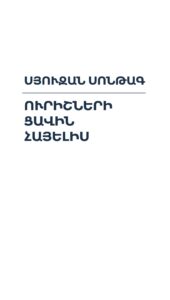
AUA Press Publishes Armenian Translation of Susan Sontag’s Regarding the Pain of Others
3 min readYEREVAN, Armenia — The American University of Armenia (AUA) Press is proud to announce the publication of the Armenian translation of Susan Sontag’s influential book, Regarding the Pain of Others (2003). It is the first book by the celebrated American writer to be available in Armenian. The translation rights were acquired from David Rieff, the son of Susan Sontag, through the Wylie Agency (UK) in 2020. The translation was undertaken by AUA’s own Gayane Tevosyan (CTr. ‘19), who worked closely with the editor and director of AUA Press, Shushan Avagyan, to produce an equally compelling text in Armenian.
Sontag is best known for her groundbreaking collection of essays, Against Interpretation (1966), as well as her critical study On Photography (1977), which won a National Book Critics Circle Award for Criticism. Her book Trip to Hanoi (1968) was written as a protest against the Vietnam War. She also wrote short stories, plays, and four novels, including The Volcano Lover (1992) and In America (1999), which won a National Book Award for Fiction. While fighting cancer, Sontag wrote Illness as Metaphor (1979), a brilliant examination of the imagery in the discourse of illness. Her later critical works include AIDS and Its Metaphors (1988) and her final book, Regarding the Pain of Others (2003).
The question Sontag raises in Regarding the Pain of Others is whether photographs still have, or ever had, the power to communicate the suffering of others in such a way that viewers might be driven to alter their political assessment of a current war. As critical theorist Judith Butler writes in her article “Photography, War, Outrage” (2005), “Sontag… rages against the photograph as she does for depicting an injustice that she does not know how best to oppose… To be, as it were, a white liberal who worries the question of what one can politically do is to be self-preoccupied, guilty, introspective, even narcissistic, and so once again to fail to find a way to respond effectively to the suffering of others. What she forgets is that she is writing about them and that her writings become one of the most honest and trenchant public criticisms of these wars.”
Of course, Sontag offered more than just her writings. She actually traveled to and staged acts of resistance in war zones, as, for example, during the Vietnam War and Bosnian War. Perhaps the most fondly remembered among the few who risked their lives by going to Sarajevo was Sontag, whose initial mission was to meet with members of the Bosnian chapter of PEN International to help them cope with wartime scarcities. She then returned to besieged Sarajevo on a United Nations plane with the most daring project in mind: to help local actors stage Samuel Beckett’s Waiting for Godot.
In Regarding the Pain of Others, Sontag analyzes how we look at the photographs that were produced during those and other wars. She writes, “Let the atrocious images haunt us. Even if they are only tokens, and cannot possibly encompass most of the reality to which they refer, they still perform a vital function. The images say: This is what human beings are capable of doing–may volunteer to do, enthusiastically, self-righteously. Don’t forget.”
Ironically, as Tevosyan notes in her translator’s preface, parts of the book were translated during the Second Artsakh War. “Sontag raises a series of issues that are particularly relevant, especially today,” she writes. “Those include the staging and manipulation of photographs, people’s cold-heartedness and indifference towards the pain and misery of others. Painfully, we are witnessing this today, every day.” She underscores the critical position of the translator to deliver Sontag’s message in the target language with care and responsibility. In her final paragraph, Tevosyan dedicates her translation to all the Armenian soldiers and civilians who tragically perished in the recent war.
Copies of the Armenian translation of Regarding the Pain of Others will be available in most libraries throughout Armenia and can be acquired free of charge from AUA’s Papazian Library. AUA Press is planning to organize a book launch in September.
Founded in 1991, the American University of Armenia (AUA) is a private, independent university located in Yerevan, Armenia, affiliated with the University of California, and accredited by the WASC Senior College and University Commission in the United States. AUA provides local and international students with Western-style education through top-quality undergraduate, graduate, and certificate programs, promotes research and innovation, encourages civic engagement and community service, and fosters democratic values.
Media Coverage:
[Aravot] «Ուրիշների ցավին հայելիս». լուսանկարի սոնթագյան զորությունը՝ հայերեն

